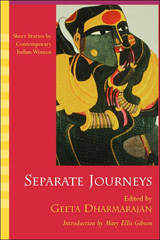

University of South Carolina Press, paperback, 9781570035517
SHORT STORIES BY CONTEMPORARY INDIAN WOMEN
Separate Journeys is an anthology of short stories by fifteen modern Indian writers, all women, originally conceived in response to the 1986 Frankfurt book fair, the theme of which was "India: Change in Continuity". Two of the stories were originally written in English (as the Indian vehicular language); the others have been translated from Assamese, Bangla, Gujarati, Hindi, Kannada, Malayalam, Marathi, Tamil, Telugu and Urdu, in four cases by the writer herself. Much of the Indian literature I had read in the past was written at least partially with the Western reader in mind, whereas these stories give a fascinating glimpse of another India with no thought for the outsider, and I rationed myself to one a day in order to savour them—and also so as to try to preserve their distinctness in my mind. The anthology was originally published in both India and the UK, and I found myself wishing that I were at once an Indian reader and the reader that I am; I wanted to share the Indian reader's advantage of being able to distinguish what's representative of a particular region (or indeed of the country as a whole) from what's particular to an individual writer.
The "separate journeys" here combine to take the reader on a voyage into an intriguing land. We are taken into the places of everyday life, as in Anita Desai's "Private Tuition with Mr Bose," a gentle tale of a teacher engaged in a soul‒destroying struggle to pass on the magic of Sanskrit verse to his unappreciative private pupils, while his wife bangs pots in the kitchen. And in "Justice" by Urmila Pawar, a lawyer visiting his native village for the first time in years becomes embroiled in a village council to determine who has got an unmarried local girl pregnant, with unexpected results. Yet we are often taken beyond the boundaries of "normal" life, to the cemeteries and cremation grounds where the lower castes handle the dead ("The Empty Chest" by Mamoni Raisom Goswami); across the fields to where the outcast bayen lives in isolation ("Bayen" by Mahasweta Devi); to the makeshift settlement inhabited by transvestites, eunuchs and hermaphrodites— more outcasts ("The Hijra" by Kamala Das). My appreciation of one of my favourite stories in this anthology, "Thayyaal", about a dowry provided by a rich old woman to thank the father of the bride for protecting her honour decades earlier, was enhanced by the mystery added by the statement in the section with contributors' details that "despite our best efforts we have not been able to locate any information" about Rupavati, the writer.
Separate Journeys is a rich and thought‒provoking anthology that offers the reader a
greater understanding of the lives of women in India. Reading it is a journey well worth taking.